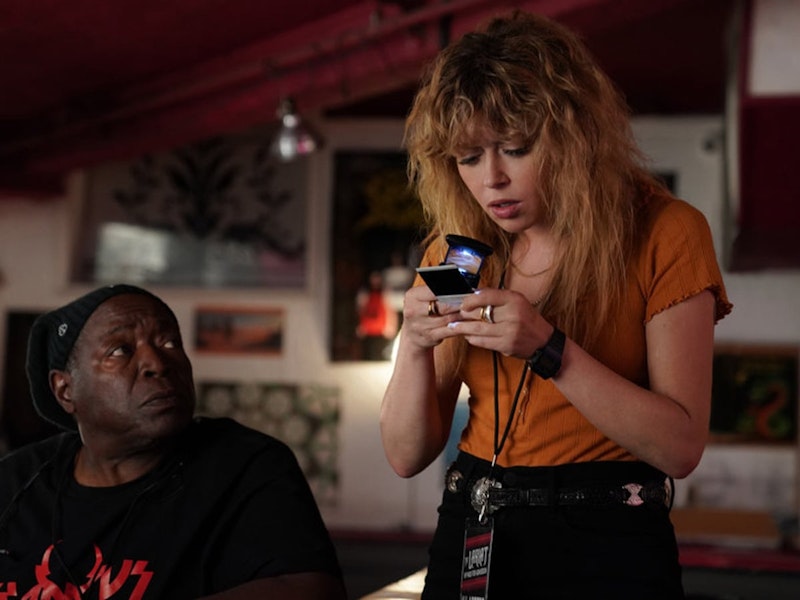For a series that seems largely premised around the fact that Natasha Lyonne sounds a little like Peter Falk, Poker Face is pretty good. Lyonne plays Charlie Cale, the show’s Columbo, a former card shark turned cocktail waitress with a preternatural (bordering on supernatural) talent for lie detection. After the pilot puts Charlie on the run from a shady casino owner (Ron Perlman), each subsequent episode finds her in a new remote part of the US—a gas station in the New Mexico desert, a barbeque joint in rural Texas, a snowy ski town that Charlie dubs “Shit Mountain”—each time with a new murder to solve. It’s Columbo meets The Fugitive.
A little suspension of disbelief goes a long way here. “I have been kind of a death magnet,” Charlie says, which is all the explanation anyone needs. Like Columbo, Poker Face is a howcatchem, or inverted detective story, in which the killer’s identity is known from the beginning. A typical episode opens with a murder, then backpedals to show the story from Charlie’s perspective. Sometimes she knows the victim, sometimes she knows the perp, and sometimes she’s just passing through when her bullshit detector starts buzzing. (Charlie has a habit of shouting “bullshit!” when she hears a lie, the closest thing Poker Face has to a catchphrase.) As opposed to the normal procedural in which the mystery’s usually a question of who, the howcatchem is, true to its name, all about the how: how does the perp commit the murder, how do they cover their tracks, and most of all, how do they slip up?
In most cases, their first mistake is lying to a human lie detector. In the hands of a lesser creator, this conceit would feel cheap. It’s not difficult to imagine someone describing the premise the way Dukie on The Wire enthusiastically describes the ridiculous soap operatics of Dexter (“it’s a serial killer that kills other serial killers!”). But Rian Johnson is no slouch in the mystery genre, having written and directed three detective stories before Poker Face: the high school noir Brick, the updated Christie whodunit Knives Out and its sequel, last year’s Glass Onion. While I hated the latter film—a shameless wreck of product placement, celebrity cameos, and miscalculated comedy of manners—I find David Bordwell’s defense semi-persuasive: “No film I can recall has so thoroughly routed the offstage activities of the detective onto a track parallel to that of the unfolding crime.” Poker Face one-ups Knives Out and Glass Onion in this respect, oscillating back and forth between parallel storylines to heighten the viewer’s curiosity, finding unique opportunities for tension and surprise.
Every episode is a self-contained puzzle, each time playing with Bordwell’s three bedrocks of storytelling (linearity, viewpoint, segmentation) a little differently. The series’ episodic nature is refreshing in the era of long-arc TV. As the once episodic cop dramas like Law and Order increasingly rely on boring character arcs that nobody cares about, Poker Face is rare: a show that one could conceivably watch a random episode of and be able to follow. Each episode is its own short film, complete with title cards like “REST IN METAL” and “ESCAPE FROM SHIT MOUNTAIN” in Columbo typeface, with the copyright year in Roman numerals underneath.
Exactly how much Peacock paid Johnson to develop the series remains unclear, but he seems to have creative free rein and a sizable budget. He and Lyonne also have a long list of friends they can call upon to make appearances. As was the case with Columbo, Poker Face is stacked with notable guest stars, including Adrien Brody, Joseph Gordon-Levitt, Tim Meadows, Nick Nolte, Ellen Barkin, and Chloë Sevigny. But it’s still Lyonne’s show, one she commands with her unmistakable ashtray voice (Poker Face is the rare contemporary TV series that allows its protagonist to smoke cigarettes) and extroverted Everywoman gregariousness. If the class politics that rang so hollow in Glass Onion works in the context of Poker Face, we mostly have Lyonne to thank—one of a few Hollywood actors who can conjure a convincing working class character. For the many people in this country who are just getting by, whose experiences and struggles are seldom depicted in the bullshit prosperity porn of modern media, Poker Face holds up a long overdue mirror image in Charlie: a working class hero with an allergy to bullshit.

